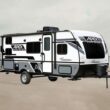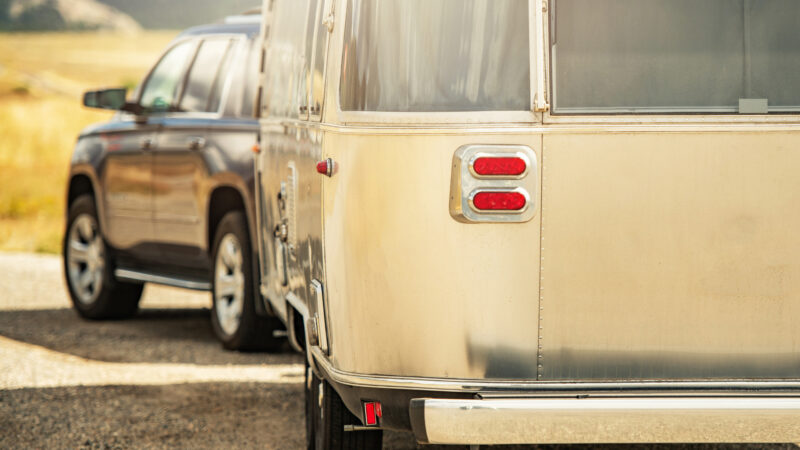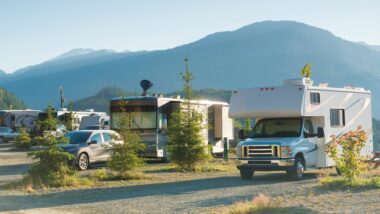Table of Contents Show
When you hit the open road with your RV in tow, you may feel excited and terrified all at the same time. If you’ve never towed a trailer, it can take some time to get comfortable. We’ve created this newbies guide for towing an RV. We hope you can feel more confident towing by the end.
Is Towing an RV Difficult?
If you’ve never towed anything, towing an RV can be difficult. However, with a little bit of practice and knowledge, you can easily handle whatever situation the road throws at you. Having confidence and a plan will help you make wise decisions along your route.
Choosing the Right Tow Vehicle
If you don’t have the appropriate tow vehicle, no amount of knowledge or advice can help you. You need to make sure that your tow vehicle can handle whatever trailer you plan to hitch up. If not, it can create a hazardous situation for you and others on the road. Let’s look at a couple of things you should consider when choosing the right tow vehicle.
Trailer Weight
You want to consider the weight of the trailer when choosing the right tow vehicle. Remember that this means the trailer’s weight when fully loaded and not the “dry weight.” You likely plan to bring chairs, food, and camping gear with you on your excursion, and all of those things add up.
Typically 9% to 15% of a trailer’s total weight will rest on the tow vehicle. Depending on the size of the trailer, this can be a couple of hundred pounds or more. Make sure you consider the trailer’s weight when choosing a tow vehicle. If not, you’ll likely need to downsize your RV or upgrade your tow vehicle. This mistake can cost you thousands of dollars and is easily avoidable.
Vehicle’s Towing Capacity
You must consider your vehicle’s towing capacity, or you could increase the wear and tear on your suspension and drivetrain. The towing capacity of your truck may change depending on the type of hitch you use. However, payload capacity doesn’t change.
You don’t want to reach the limit of your towing numbers. You should give yourself a generous amount of room, at least 10% or more, for all your towing numbers. Being up against the maximum capabilities of your vehicle can put you at risk for a dangerous situation. It’s always better to have too much than not enough.
Pro Tip: Many new trucks include tow haul mode, check out our article that helps make it clear when to use it with your RV!
Understand Your Hitch Type
There are two popular types of hitches used for towing RVs. Let’s take a look at each to see which one is right for you.
Fifth Wheel Hitches
A fifth wheel hitch sits in the bed of a pickup truck. These hitches are smaller versions of what you see on semis and other large towing vehicles. They use locking jaws to connect to a trailer’s kingpin. If you want to tow a large trailer like a fifth wheel or toy hauler, you’ll likely need this type of hitch.
The disadvantage to this one is that they’re extremely heavy. Some hitches can weigh upwards of 300 lbs, making them extremely difficult to remove when not in use. This means you’ll lose a large amount of space in the bed of your truck if you can’t uninstall it between trips.
Pro Tip: Check out the 5 best 5th wheel hitches on the market!
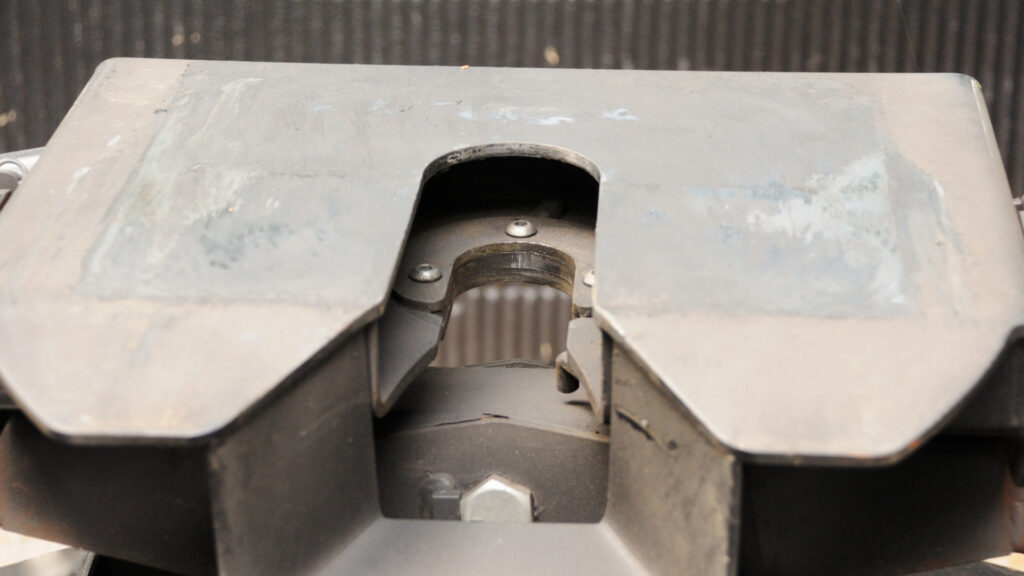
Travel Trailer Hitches
Travel trailers use a much different hitching system than fifth wheels. You’ll typically find these RVs using a hitch ball and coupler system to connect the trailer to the tow vehicle. Many trucks come with a hitch ball installed or a receiver to easily add one.
Some refer to these types of hitches as “bumper pull.” A travel trailer hitch is convenient for those looking to get smaller trailers. However, if you plan to tow regularly, consider purchasing a weight-distribution hitch or sway bars to help control your travel trailer while towing your RV.
Pro Tip: Check out our top finds for the best weight distribution hitches to tow your RV safely!
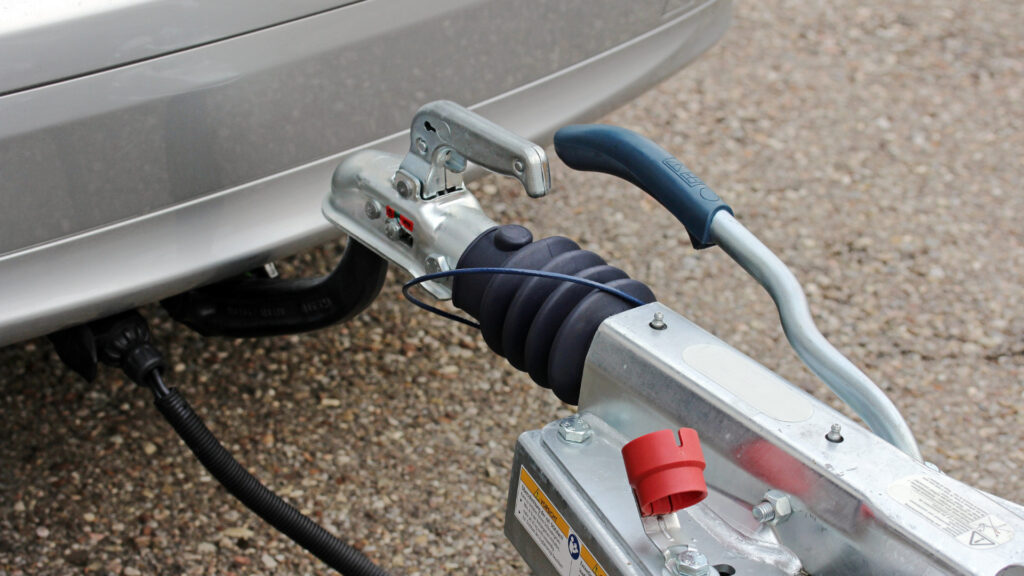
Learn How to Hitch Your Trailer Properly
Take the time to learn how to hitch and unhitch your trailer correctly. This can become incredibly dangerous if not done right. If necessary, create a checklist to ensure you do each step in the proper order. Doing it out of order, or forgetting one part, can easily lead to death or injury.
Your RV dealer may hitch up your RV for you, but make sure you’re comfortable and familiar with the process before pulling off the lot. You’ll likely need to unhitch your RV when you get home or to the campsite. That’s not the best time to figure it out.
Know Your RVs Length, Width, and Height
When driving in a typical vehicle, you likely ignore length, width, or height restrictions. Most cars have little to no issues with any of these. However, it’s an entirely new ballgame when you tow an RV.
Some people will measure their RV and then attach a label or sticky note to their dash to avoid errors. You don’t want to speed towards a low clearance bridge at 65 mph trying to remember your RV’s length, width, or height.
You should also know your weight. Some roads or bridges have weight limits that could force you to seek an alternate route. It’s worth taking a quick trip across a CAT scale with your RV fully loaded to get an idea of your weight. You should do this after adding or subtracting any significant weight from your RV.
Plan Your Route Carefully
Having a plan for your route is incredibly important when towing. Due to the increased length of your tow vehicle and trailer, you may have difficulty navigating city streets or even gas stations. You want to avoid unnecessary stops while towing because you might easily get into a location but have difficulty getting out.
When you plan your route, keep in mind that interstates and highways will be your friends. This is especially true if you tow a larger trailer. While you might enjoy taking the scenic route, it can cause difficulty for RVs.
Interstates and highways typically have fuel stations and other amenities that can handle big rigs. If you want to explore a scenic route, consider unhitching at your campsite and driving back with just your vehicle.
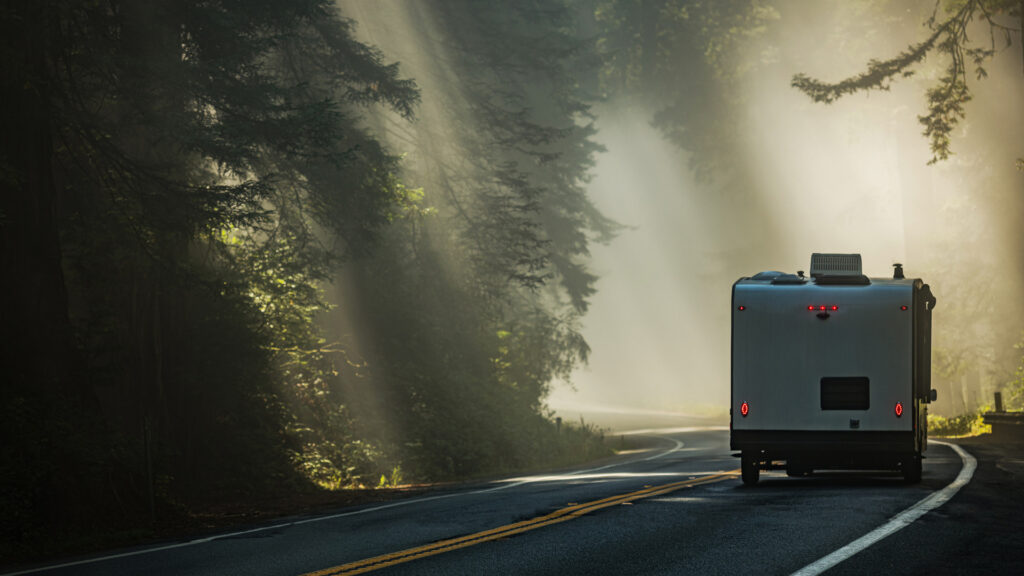
Towing Your RV Safely
You want to tow your RV as safely as possible. If not, you run a higher risk of getting in or causing an accident. This can quickly dampen any plans for an adventurous RV trip. Let’s take a look at a handful of tips for staying safe while towing your RV.
Drive Slowly
You shouldn’t expect to set any land speed records while towing. You might not know it, but your RV’s tires likely come with a speed rating. Some speed ratings for RV tires are as low as 55 to 65 mph.
Exceeding your speed rating can cause your tires to heat up, resulting in a blowout. Tire blowouts can leave you on the side of the road changing a tire and be dangerous for yourself and other drivers. Plus, it can cause massive amounts of expensive damage to your RV.
Many RVers refuse to travel faster than 65 mph when towing, even if the speed limit is 70 mph. Some states even have reduced speeds for vehicles towing trailers. So make sure you follow all applicable speed limits and keep yourself and others safe.
Braking and Stopping Distance
When towing a large trailer, your braking and stopping distance exponentially increase. It will require much more room than you might typically need. This is important to keep in mind when vehicles get in front of you prematurely. While they may stop in time, you won’t, which typically ends with you rear-ending them.
The faster you go and the heavier your trailer, the longer you’ll need to stop. Ensure you keep an appropriate distance between you and the car in front of you, and prepare for those yellow lights changing to red.
Account for Wide Turns
You’ll need to get used to taking wide turns when towing an RV. Your trailer will take a slightly tighter path inward than your tow vehicle. When people take turns too sharp, the best-case scenario is that they hit a curb and do little to no damage to their RV.
However, this situation can end with you sideswiping a street sign or light pole, which can cause massive amounts of damage to your RV. You don’t want to tow your trailer off the dealership lot straight to the repair shop.
When you make turns, take them wide. Some right turns may even require that you use the opposite lane to avoid hitting any obstacles. If you need to use the opposing lane, give any vehicles in your way plenty of notice and take your time. It’s better to proceed slowly and with caution than force yourself into a situation and damage your RV or someone’s property.
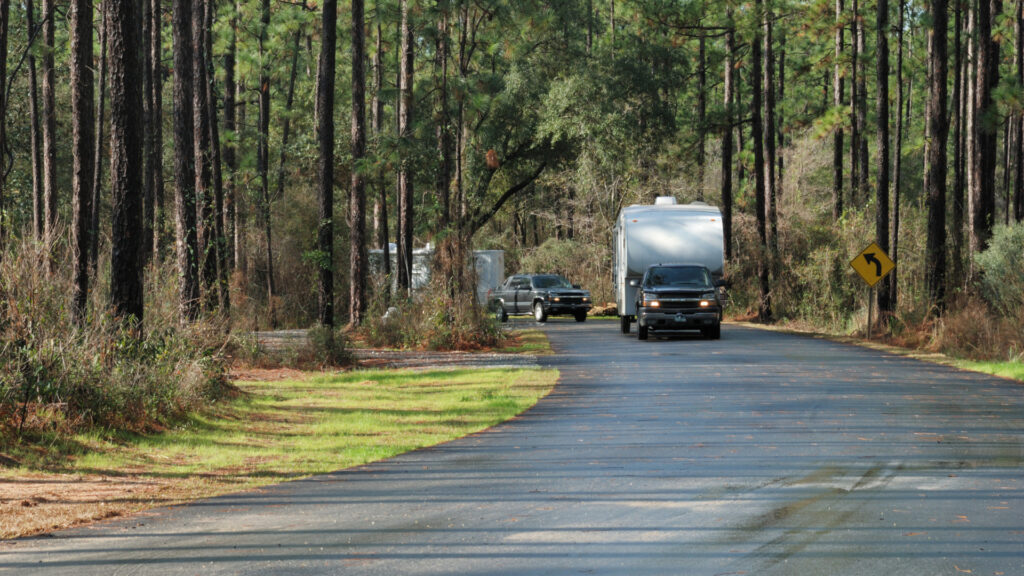
Correcting Trailer Sway or Chucking
A trailer brake will be one of your best friends for controlling trailer sway or chucking. A soft squeeze of your brake controller can keep it in check. If it continues, you can try accelerating to regain any loss of control.
If these do not help the situation, you’ll want to remove your foot from the accelerator and allow your vehicle and trailer to slow down naturally. Don’t give in to any desire to slam on your vehicle’s brakes. This will likely only magnify the issue and cause a much more dangerous situation.
If this becomes a frequent issue, you may need to invest in a new hitch or adjust it. It could signal that you have too much weight on your trailer and not enough on the truck or vice versa. Having the appropriate hitch set up properly can make a huge difference in your towing experience.
Pro Tip: Check out these best truck upgrades to make your towing experience that much better!
Practice Parking
If you’ve never towed before, parking a trailer can cause some frustration, especially when maneuvering a trailer in reverse. Everything you know about backing up a vehicle flips when towing an RV. When you turn the wheel right, the trailer goes left. So make sure you practice maneuvering your RV before hitting the road.
One of the best ways to do this is by finding a large empty parking lot. Remember that just because you see an empty or abandoned parking lot doesn’t mean it’s free to use. Get permission to use a parking lot for practice.
Set up some cones and practice backing into spots or making your turns. Test to see how tightly you can safely turn without damaging your truck or trailer. Get comfortable squeezing your trailer brake so you know what to expect if you ever need to use it.
You can never practice too much, even if you’ve towed for years. Practice can help prepare you for future scenarios you might encounter on the road.
Pro Tip: Once you’ve parked your RV and unhitched it, keep it safe with one of the best trailer hitch locks!
Towing an RV Requires Patience
We hope this guide is helpful to you if you’re a newbie. If you’re not a newbie, we hope it was a reminder of some of the important things you should keep in mind while towing your RV.
Stay calm and have patience with yourself and anyone helping you navigate or park your RV. What are some of the best tips you have for a newbie when it comes to towing an RV?

